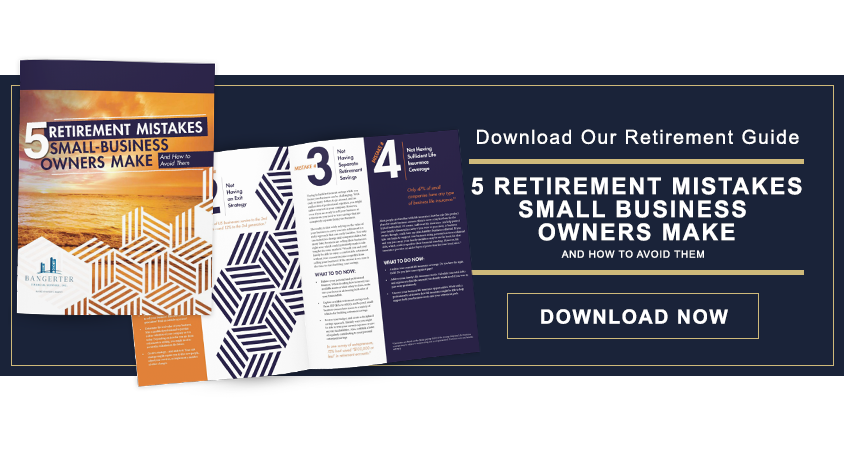As a small business owner, you’ve got a lot on your plate. You’re responsible for growing your company, meeting the needs of your customers, and fulfilling obligations to your employees. When you’re juggling so much, it’s easy to let your retirement planning fall to the wayside.
Even if you are setting aside time to focus on your future, you may be making some errors that are holding you back. The good news is, the sooner you become aware of the problem, the easier it is to reverse course. Here’s a closer look at some of the common retirement mistakes small business owners make.
1. Failing to Create a Retirement Road Map
With so many responsibilities competing for your attention, it’s easy to put retirement planning on the back burner. Unfortunately, every day that goes by is a missed opportunity to start making progress towards achieving the retirement of your dreams.
Many business owners mistakenly believe that building their business is a retirement strategy. However, it’s important to have a clear retirement road map in place. Otherwise, you can’t ensure that you’ll be able to comfortably handle unexpected issues that may come up with your personal life or your business.
To overcome this problem, take some time to think about when you would like to retire and what you want your lifestyle to look like when you do. Once you have a clear picture, determine what you need to do to ensure you have enough financial security to live the life you want. Finally, commit to taking the necessary steps to achieve your goals and hold yourself accountable.
2. Not Having an Exit Strategy
Many small business owners dream of eventually selling their company for top dollar or passing it to their children. However, statistics show that less than a third of business owners actually have a business succession plan in place. If you want your business to last beyond your career, now is the time to start planning for your transition.
Begin by thinking through what you want to do with your business when it’s time for you to retire. Even if you’re not planning to retire for a while, it’s important to have a clear grasp of how much your company is worth today. Consider hiring a qualified professional to complete a business valuation and provide some projections. Based on this information, create an exit strategy and begin planning the moves you’ll need to make when the time comes.
3. Failing to Separate Your Retirement Savings
There’s nothing wrong with reinvesting profits into your company. However, completely relying on the sale of your business to cover your retirement needs is a risky prospect that could easily backfire.
Ask yourself if you and your family would be able to enjoy a comfortable retirement if you no longer had your current income or profits from the sale of your business. If the answer is no, it’s time to start focusing on building a separate retirement nest egg.
If you don’t already have a retirement plan in place, like a 401(k) or a SEP IRA, consider establishing one now. At least once a year, review your budget, evaluate your savings strategy, and look for ways to boost the amount you’re putting into your retirement plan.
4. Not Having Enough Life Insurance Coverage
Nobody wants to think about what would happen if they died prematurely, but it’s a possibility you need to address. It’s no secret that making sure you have enough life insurance can help secure your family’s financial future. However, when you own a business, proper coverage is even more important.
If you haven’t already done so, consider working with a professional to evaluate your personal life insurance needs. Then take things a step further by determining how you may be able to use life insurance to support both your business and retirement goals.
5. Trying to Do it All Yourself
Many small business owners are so used to having to juggle countless responsibilities that they forget they don’t have to do everything on their own. When it comes to planning your retirement, don’t make the mistake of foregoing professional advice.
Working with a team of professionals can help you balance your personal and business finances and stay on top of important regulatory and tax issues.
To ensure your needs are covered, consider hiring a financial advisor, a tax professional, and an attorney. When conducting interviews, confirm that they’re all willing to work together and communicate with each other. Knowing you have this support network in place will help you feel more comfortable and increase the likelihood of reaching both your personal and business goals.
Get Your Retirement Back on Track
If you recognize one or more of these common mistakes, it’s not too late to get your retirement back on track. You owe it to yourself to take action now. Contact us today to schedule a consultation. This is for informational purposes only, does not constitute as individual investment advice, and should not be relied upon as tax or legal advice. Please consult the appropriate professional regarding your individual circumstance. Investment advisory services offered through Bangerter Financial Services, Inc. A state Registered Investment Advisor. Registered Representative and securities offered through Concorde Investment Services, Inc. (CIS), member FINRA/SIPC. Bangerter Financial Services, Inc. is independent of CIS.
This is for informational purposes only, does not constitute as individual investment advice, and should not be relied upon as tax or legal advice. Please consult the appropriate professional regarding your individual circumstance. Investment advisory services offered through Bangerter Financial Services, Inc. A state Registered Investment Advisor. Registered Representative and securities offered through Concorde Investment Services, Inc. (CIS), member FINRA/SIPC. Bangerter Financial Services, Inc. is independent of CIS.
All information has been obtained from sources believed to be reliable, but its accuracy cannot be guaranteed. There is no representation or warranty as to the current accuracy, reliability or completeness of, nor liability for, decisions based on such information and it should not be relied on as such. All investing involves risks, including the loss of principal.




.png?width=273&height=103&name=Brokercheck%20(1).png)

Comments